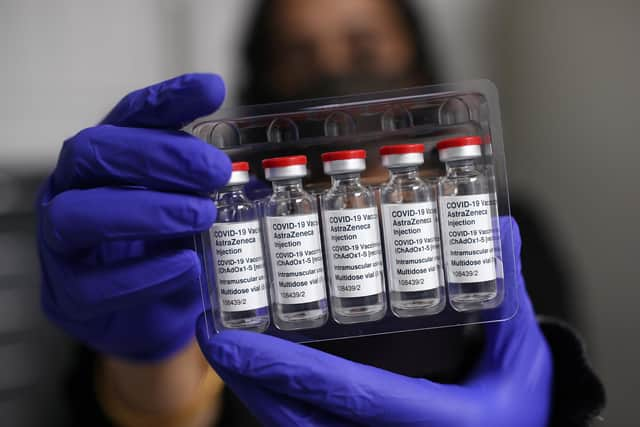AstraZeneca Covid vaccine linked to small risk of blood condition
The condition, known as idiopathic thrombocytopenic purpura (ITP), is characterised by low platelet counts, and can lead to bleeding or blood clots.
Researchers say the chance of developing ITP after receiving the vaccine is still lower than that of developing it because of Covid-19, and that it should not deter the roll out of the vaccine programme.
Advertisement
Hide AdAdvertisement
Hide AdThe increased risk is estimated to be 11 per million doses, similar to figures for Hepatitis B, flu and MMR vaccines.


The same risk was not found for the Pfizer vaccine, also included in the research.
The study of 5.4 million people in Scotland, of whom 2.5 million had received their first vaccine dose, is the first analysis of ITP, clotting and bleeding events following vaccination for an entire country.
The Medical and Healthcare products Regulatory Agency (MHRA) had previous reported low platelet counts in combination with blood clots after AstraZeneca vaccination, estimated at about 13 per million first doses.
Experts say the new study’s specific findings about ITP are likely to be a manifestation of this general condition. The MHRA is actively monitoring the situation.
Researchers were unable to establish a definitive link between other forms of clotting – including the rare form called cerebral venous sinus thrombosis or CVST – due to the very low number of cases in vaccinated people included in the study.
Those at most risk from ITP tended to be older, and with least one underlying health condition such as coronary heart disease, diabetes or chronic kidney disease.
The research team, led by Edinburgh University, and including Aberdeen, Strathclyde, Glasgow and St Andrew’s Universities, analysed a dataset as part of the EAVE II project, which uses anonymised linked patient data to track the pandemic and the vaccine roll out in real time.
Advertisement
Hide AdAdvertisement
Hide AdThey also also looked at health records dating back to September 2019 to investigate any previous issues with ITP, clotting or bleeding disorders.
The data – including GP records on vaccination, hospital admissions, death registrations and laboratory test results – was then compared with those yet to be vaccinated to determine if any clotting events were outside what would have been expected pre-pandemic.
The data indicated that there was a slight increase in ITP in the second week following vaccination for those who received the Oxford-AstraZeneca vaccine and possibly also increased risk of arterial clotting and bleeding events.
The results are published in the journal Nature Medicine.
Professor Aziz Sheikh, Director of Edinburgh University’s Usher Institute and EAVE II study lead, said: “This careful analysis of an entire country’s vaccination programme, which involved the study of over 2.5m first dose vaccines, has found a small increase in the risk of ITP, clotting and bleeding events following the Oxford-AstraZeneca vaccine.
"This very small risk is important, but needs to be seen within the context of the very clear benefits of the vaccines and potentially higher risks of these outcomes in those who develop Covid-19.”
A message from the Editor:
Thank you for reading this article. We're more reliant on your support than ever as the shift in consumer habits brought about by coronavirus impacts our advertisers.
If you haven't already, please consider supporting our trusted, fact-checked journalism by taking out a digital subscription.
Comments
Want to join the conversation? Please or to comment on this article.
